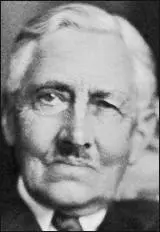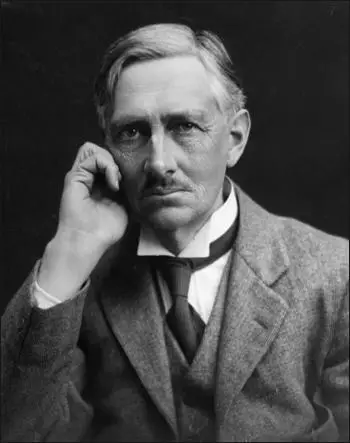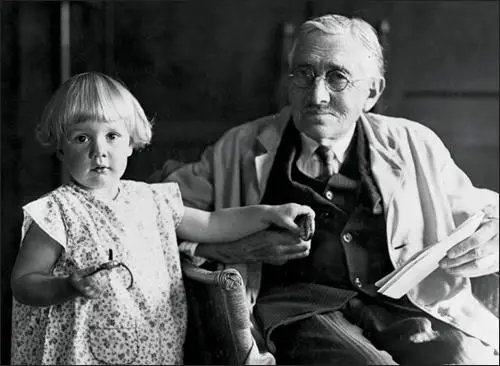Frederic Truby King

Frederic Truby King, the fifth of the seven children of Thomas King, a bank manager and his wife, Mary Chilman, was born at Mangorei farmstead, near New Plymouth, New Zealand, on 1st April 1858. King was one of the first settlers to arrive from Britain and became a member of parliament in 1854 and held the position of Treasurer in the Provincial Council. (1)
In 1859, Truby King, when he was only 12 months old, nearly died, when he fell ill with seasickness and diarrhoea. "The doctor decided not to 'bleed' him, which he would have done for most ailments, and instead fed him arsenic and mercury. After eight doses of poison, little Truby's father told him to leave the boy alone to die in peace. Miraculously, he survived but his health was never good. He would suffer gastroenteritis, bronchio-pneumonia, and pleurisy, and lose the sight in one eye due to tuberculosis." (2)
According to his biographer, Philippa Mein Smith, Truby King was "educated at home by a tutor who encouraged him in the habit of single-minded concentration which characterized his career." At 15 King became a clerk under his father at the New Plymouth branch of the Bank of New Zealand. However, he left the country in August 1880 to study medicine at the University of Edinburgh. After graduating with a first-class degree in 1886 he went on to obtain a BSc in public health. (3)
Frederic Truby King and Seacliff Lunatic Asylum
On 26th October 1887, at Edinburgh, he married Isabella (Bella) Cockburn Millar, the daughter of a jeweller, Adam Millar. In the month following their marriage, Truby King took a post as ship's surgeon on the Selembria, and accompanied by his new wife sailed to New Zealand. His knowledge of public health principles was useful in his first appointment as medical superintendent of Wellington District Hospital. In 1889 he was appointed as medical superintendent of Seacliff Lunatic Asylum, the country's largest and most expensive asylum. He was also appointed lecturer in mental diseases and examiner in public health and medical jurisprudence at the University of Otago. (4)
King turned the asylum into a workable institution with a productive farm and beautifully planted grounds. Within the asylum King promoted fresh air, exercise, good diet, work and recreation as the appropriate treatments for mental illness. In 1894 Truby King was granted 12 months' leave to return to England to study brain pathology. He also set off for a six-month visit to Japan. Truby King was particularly impressed by the physical fitness of the Japanese and by the custom of extended breast feeding. In 1905 the couple adopted a daughter, Mary, the child of a widowed nurse. (5)
Isabella Truby King was not happy with the child's progress and requested help from her husband. "In this way Truby King's formidable attention was directed away from the nutrition of animals towards the feeding and care of infants, a field that linked his desire for the prevention of insanity and his experimental work with nutrition." In May 1907, established the Society for the Promotion of the Health of Women and Children, which later became known as the Plunket Society. Its slogan became "help the mothers and save the babies". (6)

Truby King’s method of raising children involved doing everything according to a routine, ignoring the wants of the child and sticking solely to the routine in place. He suggested implementing a uniform schedule in which each aspect of the baby’s life was controlled. This included specific times for feeding, sleeping, bathing and bowel movements. King believed that at the age of six weeks, toilet training should commence and be continued until the child was sufficiently trained. Cuddling with an infant was not to exceed 10 minutes per day and there was a specific hour set aside for holding the child; this was the only time the parent was allowed to hold the child. If an infant started crying, the parents were supposed to let him or her cry without giving additional attention. King argued that without discipline children would become spoiled, leading them to develop into “unproductive and self-indulgent adults.” (7)
Truby King's reputation in infant welfare grew, and he fuelled the movement by making exaggerated claims about its impact on infant mortality. "The key to the Truby King method was to feed babies by the clock every four hours and preferably never at night - stoically ignoring demands for sustenance in between. He recommended placing babies in their own rooms immediately and leaving them in the garden for long periods to toughen them up." (8)
Feeding and Care of Baby (1908)
He became famous, however, for his work in infant welfare, which grew from his preoccupation with racial betterment in his campaign of "practical eugenics". (9) Hilary Stace has pointed out that Truby King's views were very popular with the upper-classes as it was very close to what they were already doing and reflected their fears about the future of their culture. Stace wrote: "The destiny of the race is in the hands of the mothers". He believed the body was a closed system with a limited amount of energy. The education of girls, in anything other than domestic skills, used up their energy and could make them unable to breed or breastfeed. He believed mental degeneration was caused by poor mothering. "If only women could be taught the science of mothering the racial decline of the Empire could be arrested. Instead they would breed fit soldiers for the Empire." (10)
Frederic Truby King published Feeding and Care of Baby in 1908. The book sold well and in 1912 King was seconded to the Department of Public Health for six months to travel New Zealand promoting infant welfare. He took the cause abroad in 1913 when he was appointed the government's delegate to an international infant welfare conference in London. His book was published in Britain and over the next few years became "the definitive baby manual in Britain". (11)
Truby King argued that child-rearing was about routine and discipline. "The formative months were for eating, sleeping and growing - not bonding." Childcare historian, Hugh Cunningham the author of Children and Childhood in Western Society Since 1500 (2005) says mothers were inclined to trust the experts of the era. "A significant number of people simply thought science was telling them and therefore it was the right thing to do." (12) Philippa Mein Smith has suggested: "King's code embodied active puritanism, fusing post-Darwinian science with traditional moral edicts". (13)
Bella Truby King played an important role in his success. She became his personal secretary and because of her "linguistic and literary skills" she helped to publicize her husband's ideas. The popular column 'Our Babies' appeared under her husband's name in more than 50 New Zealand newspapers. According to Rhonda Bartle "her quiet order and intelligence seemed to neatly balance King's organised chaos and absent-mindedness." (14)
Final Years
In 1921 Truby King took up the newly created post of director of child welfare. However, he upset the medical profession by blaming infant deaths and morbidity on unnecessary instrumental deliveries. Increasingly dogmatic and autocratic, it was decided to remove him from his post and in 1924 he was appointed as inspector general of mental defectives. The following year he was knighted but the death of Bella in January, 1927, left him devastated. His adopted daughter commented that it was "the beginning of the end" for her father. (15)

Frederic Truby King died on 9th February 1938. In a funeral eulogy the bishop of Wellington said that King had the eyes "of a visionary, almost of the fanatic". (16) "He was the first New Zealand private citizen to receive a state funeral and possibly the only bankrupt to be so honoured, his assets having been spent on his idealism. In 1957 he became the first New Zealander to have his image replace the monarch's on a postage stamp." (17)
Truby King's ideas on child-care remained extremely popular up to the 1950s when he went out of fashion and was replaced by more child-centred experts such as John Bowlby, Benjamin Spock, Donald Winnicott and Penelope Leach. However, it has been argued that the books written in recent years by Gina Ford mirrors those of Truby King: "The so-called Queen of Routine's parenting plans are loved and loathed but never ignored... But at one point three of her books accounted for 25% of the sprawling childcare books market, and she boasts celebrity supporters such as Kate Winslet... Her bestselling guide advocates a strict regime for both parent and child, broken into five-minute slots, which is built around set feeding times to establish a routine as early as possible. It recommends ignoring a crying child to help restore sleeping patterns in certain circumstances, as well as not making eye contact before bedtime to avoid excitement." (18)
Primary Sources
(1) Rhonda Bartle, The Story of Truby King and the Plunket Movement (1st February 2005)
Before he was even one year old, Truby King almost died. Evacuated during the Taranaki Wars of the 1860s he fell ill with seasickness and diarrhoea. The doctor decided not to 'bleed' him, which he would have done for most ailments, and instead fed him arsenic and mercury.
After eight doses of poison, little Truby's father told him to leave the boy alone to die in peace. Miraculously, he survived but his health was never good. He would suffer gastroenteritis, bronchio-pneumonia, and pleurisy, and lose the sight in one eye due to tuberculosis...After following his father into banking, King switched to medicine and at the age of 28, graduated from Edinburgh University as Master of Surgery. He took out the coveted Ettles Scholarship as the most distinguished student. Curiously, the top three students that year all hailed from New Zealand.
But what most set King apart was his overwhelming single-mindedness for anything that took his fancy. Credit for this probably goes to Henry Richmond, whose classroom was Richmond Cottage, one of New Plymouth's oldest surviving buildings. Richmond preached focus until a subject was fully mastered, so even when very young, King showed remarkable 'stickability'.
(2) Alex Campbell, BBC News (4th May, 2013)
Child welfare reformer Sir Frederick Truby King is credited with drastically reducing infant mortality in his native New Zealand. His research also led to a radical improvement in childhood nutrition and he was knighted in 1925 for his contribution to society.
But for all of his laudable achievements, Truby King is undoubtedly best known as an early champion of enforcement parenting - with its emphasis on discipline and detachment.
The key to the Truby King method was to feed babies by the clock every four hours and preferably never at night - stoically ignoring demands for sustenance in between.
He recommended placing babies in their own rooms immediately and leaving them in the garden for long periods to toughen them up. He also imposed a 10-minute daily cap on cuddles.
Parenting was about routine and discipline. The formative months were for eating, sleeping and growing - not bonding.
